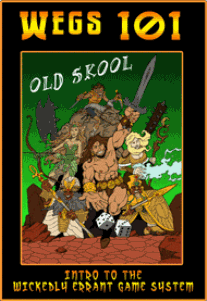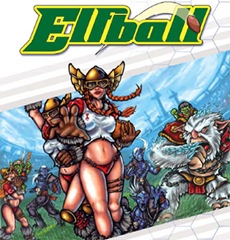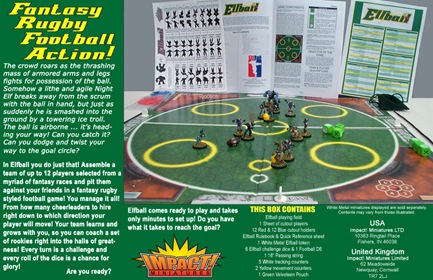 games at Origins 2010. Next up was WEGS (Wickedly Errant Game System) 101: Old Skool by GameWick Games. I was intrigued by the flyer they had set out near registration (I’m a sucker for Old School marketing), so I made a point of trying it. Per their web site, “WEGS is the action-packed, dice-rolling, casino-crazed, sword-n-sorcery system that you and your dice have been waiting for!”
games at Origins 2010. Next up was WEGS (Wickedly Errant Game System) 101: Old Skool by GameWick Games. I was intrigued by the flyer they had set out near registration (I’m a sucker for Old School marketing), so I made a point of trying it. Per their web site, “WEGS is the action-packed, dice-rolling, casino-crazed, sword-n-sorcery system that you and your dice have been waiting for!” Was it that? Well, it was a decent system but, honestly, I’m having trouble remembering its inner workings. I remember that it only involved d6s and d10s and used various cards to keep track of player abilities. For example, I played a wizard, so all my spells were on individual cards. I think that the cards were an extra player aid (they were selling a special starter pack at the con which had the rulebook and the cards together). The game had some interesting mechanics, such as allowing me to pay spell points to keep various spells in play while casting new spells (which also required the use of more spell points). Every time I cast a spell I had to roll under a certain percentage for it to go off and I could spend spell points to increase my chances of success. But the game just didn’t grab me. There is nothing wrong with WEGS, but nothing made me want to pick it up.
Perhaps it’s more me than this game. I’ve played D&D so much that it’s hard for me to get excited about another fantasy RPG. If I want a fantasy RPG, I turn to D&D. Sure, I like Castles & Crusades, but that is an unabashed derivative of D&D. I have a newfound love of Savage Worlds and one can surely play it as a fantasy RPG (and it has several fantasy supplements), but I can’t imagine myself doing so. Savage Worlds appeals to me because it isn’t inherently a fantasy game. For what it’s worth, I’d be more likely to sign up for a game of WEGS than HackMaster Basic as it certainly plays quicker.
On a side note, regardless of the game system, the term “old school” (or “old skool,” as the case may be), has been beaten to death. What qualifies something as old school? Does it have to be a derivative of a classic RPG, be it D&D, Gamma World, Traveler, etc., as the OSR blogs seem to indicate? Or is it simply a style of play? I’m guessing WEGS is claiming “old school” credentials based on its hack ‘n’ slash play style. I do not have anything against the OSR blogs (far from it, I read a ton of them) or WEGS, but I guess my point is the term has started to lose meaning in the RPG world.
 I demoed Elfball by Impact Miniatures last. I had passed by this booth a couple times and finally figured I’d give it a go. Obviously, it looked like a Blood Bowl knock-off (see also Battleball
I demoed Elfball by Impact Miniatures last. I had passed by this booth a couple times and finally figured I’d give it a go. Obviously, it looked like a Blood Bowl knock-off (see also BattleballSo, let me get this off my chest right out of the gate: I hate the name. I like me some elves in my D&D and, sure, their graceful badasses, but, come on, elf football? I liked the name worse after playing because it’s a misnomer. There are several different types of teams made up of all kinds of fantasy creatures (which serve as the basis to differentiate team stats), so it's not an elf exclusive game.
Ok, so while I don’t like the name, I did enjoy the game. It’s really more of rugby game than American football (although I must confess little knowledge of rugby). The rules explicitly prohibit long bombs (there is an imaginary force field in the center of the field to prevent this) and, the small size of the board forces immediate player contact. I’d say the game felt like Necromunda football. It wasn’t overly complex, but each move (e.g., tackle, shove, etc.) involved a die roll on a particular table for that move, with the roll adjusted by various factors (e.g., bonuses for hitting from the rear, etc.).
 The demo guy knew his stuff though, so this was pretty painless.
The demo guy knew his stuff though, so this was pretty painless.The Momentum tracker was the most interesting mechanic. During your turn, you can chain together several moves and the more successes you receive, the more your Momentum increases. Once you have enough Momentum, you can spend these points to perform special maneuvers. For example, the demo guy would repeatedly shove my player, gathering momentum, then execute some special move at the end to cap it off. I really liked this mechanic because it simulated the momentum you experience with just about any sport (whether playing it or watching it). Sure, it’s intangible, but few would argue that it doesn’t exist.
The game played a bit slow (and I was a bit antsy, so I didn’t even play a full game), so I can see why the first to score wins (although apparently it’s typical to play 2 out of 3, etc.) It was fun though, so if you’re into this type of board game, it’s worth checking out (not to mention you can check out the rules for free here: link)
I played the demo for WEGS, and had a similar experience. It was fun. There were some really cool features. I thought the basic mechanic was pretty cool. I liked the aiming mechanic for ranged attacks and tracking system for the length of effect on spells. I just couldn't figure out where I would use it, so in the end, I didn't buy it.
ReplyDelete